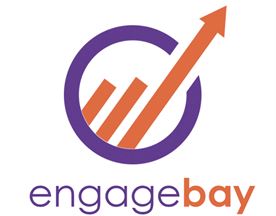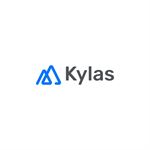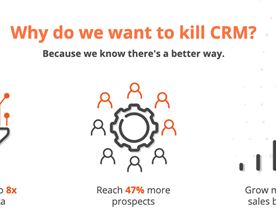CRM, or customer relationship management, is a strategy that businesses use to manage and improve their interactions with customers. It involves the use of technology, processes, and policies to build long-term relationships with customers, improve customer retention, and manage deals that ultimately drive business growth.
For small businesses, CRM is particularly important because it helps them to understand their customers better and provide personalized experiences. This, in turn, can lead to increased customer loyalty and retention, as well as improved customer satisfaction and advocacy.
By keeping track of customer interactions and preferences, businesses can also identify opportunities for upselling and cross-selling, which can help to boost revenue and profitability.
Moreover, these CRM tools can also help small and medium businesses to improve their overall operational efficiency by streamlining sales, marketing, and customer service processes. By centralizing customer data and communication channels, businesses can ensure that they are providing consistent and high-quality customer experiences across all touchpoints.

The Role of CRM Software In Enhancing Business Growth
CRM plays a critical role in all customer communications, improving client relationships and enhancing business growth in several ways. First, it helps businesses to understand their customers better by capturing and analyzing data on customer interactions, preferences, and behavior. This information can then be used to personalize marketing messages, improve product and service offerings, and provide exceptional customer service.

Second, CRM helps businesses to build long-term relationships with customers by providing them with consistent and personalized experiences. By keeping track of customer interactions and preferences, businesses can anticipate their needs and proactively address any issues or concerns. This can lead to increased customer loyalty, repeat business, and positive word-of-mouth referrals.
Third, using CRM systems can help businesses to increase sales and revenue by the sales process identifying opportunities for upselling and cross-selling. By analyzing customer data and behavior, businesses’ sales processes can identify complementary products or services that customers may be interested in and target them with relevant offers and promotions.
Overall, CRM is a powerful tool for small businesses looking to improve customer relationships, manage leads, increase customer retention and loyalty, and drive business growth.

Overview Of The Best CRM For Small Business
There are many CRM solutions available on the market, but some of the best for small and medium businesses include:
Hubspot CRM:
This is a free CRM solution that offers a range of features, including contact and customer relationship management platforms, lead capture forms, email templates, and reporting and analytics capabilities. It is easy to use and integrates with other Hubspot tools, such as marketing automation, lead management, project management, workflow automation and sales enablement.
Pipedrive:
This is a sales-focused CRM solution that offers customizable pipelines, full deal management and tracking, email integration, and reporting capabilities. It has a clean and intuitive interface and is designed to be user-friendly for small sales teams everywhere.
Zoho CRM:
This is an affordable and feature-rich CRM solution that offers extensive customization options, including custom fields, modules, and workflows. It also integrates with many other tools and platforms, such as email marketing software and social media.
Salesforce Essentials:
This is a scaled-down version of the popular Salesforce CRM, designed specifically for small businesses. It offers a range of features, including customizable pipelines, contact management, and reporting capabilities. It also integrates with other Salesforce tools, such as marketing automation and customer service.
Each of these project management CRM solutions has its own unique strengths and weaknesses, so it is important for small businesses to evaluate their own project management needs and choose the one deal management solution that best fits their budget, workflow, and goals.

Key Aspects to Consider When Selecting a CRM For Small Businesses
When selecting a CRM system for a small business, there are several key aspects to consider. These include affordability and scalability, ease of use for small teams, integration with other business tools and platforms, customization options for small business needs, and reporting and analytics for better business insights.
Affordability and Scalability
One of the most important aspects to consider when selecting a CRM for a small business is affordability and scalability. Small businesses typically have limited budgets, so it is important to choose a CRM platform that is affordable and can scale as the business grows. Some top CRM services and solutions offer free or low-cost options for small businesses, while others may require a significant investment. It is important to evaluate the features and benefits of each option and choose a CRM vendor or provider that provides the necessary features at a reasonable cost.
In addition to affordability, scalability is also an important consideration. Small businesses need a CRM system that can grow with them as their needs change. It is important to select a CRM solution that offers flexible pricing plans based on the number of users or features needed. This allows small businesses to start small and scale up as they expand without having to switch to a new system later on.
It is important to keep in mind that while some CRM systems may be initially affordable, the cost may increase as the business grows and requires more advanced features. It is important to evaluate the long-term cost and scalability of the CRM system before making a decision.
Ease of Use for Small Teams
Another key aspect to consider when selecting a CRM for a small business is ease of use for small teams. Small businesses often have limited resources and may not have dedicated IT staff to manage complex and advanced CRM features and systems. It is important to choose a small business CRM that is user-friendly and easy to learn, so that small teams can quickly adopt and effectively use the system. The small business CRM should have an intuitive interface, clear navigation, and provide easy access to important features and data.
In addition to being user-friendly, the small business CRM software should also provide training and customer support and resources to help small teams get up to speed quickly. This can include online tutorials, videos, documentation, and customer support. The small business CRM software provider should also offer ongoing technical and customer support, and assistance to help small businesses get the most out of the system.
Another consideration is the ability to customize the CRM capabilities and features to meet the unique needs of the small business. For example, the best CRM software should allow for custom fields, workflows, and integrations with other business tools. This can help streamline business processes and improve efficiency.
Overall, the ease of use of the best CRM software can have a significant impact on the success of a small business. A user-friendly system that is easy to adopt and use can improve productivity, enhance customer relationships, and drive business growth.

Integration with Other Business Tools and Platforms
The third important aspect to consider when selecting a CRM for a small business is integration with other business tools and platforms. Small businesses typically use a variety of software applications to manage different aspects of their operations, such as email marketing, an accounting software, and project management. It is important to choose a CRM that integrates with these other tools and platforms, so that data can be shared and workflows streamlined. This can help to reduce manual data entry and increase efficiency.
Integration with other business tools and platforms can be crucial for small businesses as it can help to streamline processes and increase efficiency. When selecting a CRM, it is important to consider which tools and platforms the business is already using or planning to use in the future. The best CRM also should have the ability to integrate with these tools and platforms, either through native integrations or through third-party integrations using APIs.
For example, if a small business uses Mailchimp for email marketing, the CRM should have a native integration with Mailchimp, allowing for seamless data transfer between the two systems. Similarly, if the business uses QuickBooks for accounting, the CRM should have an integration that allows for the synchronization of financial data between the two systems.
Integration with other tools and platforms can also provide additional functionality to the CRM. For example, integrating with a project management tool can allow the CRM to track customer interactions related to specific projects. This can provide a more complete view of the customer and their needs, enabling better customer service and more targeted marketing efforts.
Overall, integration with other tools and platforms is an important consideration when selecting a CRM for small businesses, as it can help to increase efficiency, reduce manual data entry, and provide additional functionality.
Customization Options for Small Business Needs
The fourth important aspect to consider when selecting a best CRM software vendor for a small business is customization options for small business needs. Small businesses often have unique requirements that may not be addressed by off-the-shelf CRM software solutions. It is important to choose a used business CRM software that provides customization options, such as custom fields, workflows, and reports, so that the system can be tailored to the specific needs of the business. This can help to increase efficiency, improve customer experiences, and support business growth.
Customization options are important for small businesses as they allow the CRM system to be tailored to the specific needs of the business. This means that the business can configure the CRM systems to capture and track the information that is most relevant to them. For example, a small business in the retail industry may need to track customer preferences and purchase history to provide personalized recommendations, while a small business in the manufacturing industry may need to track inventory levels and shipping information to ensure timely delivery.
A CRM that offers customization options, such as the ability to create custom fields, workflows, and reports, can enable small businesses to automate processes, streamline workflows, and better manage customer relationships. Custom fields allow businesses to capture and store unique customer data, that is relevant to their business operations, while custom a workflow automation can automate processes and improve efficiency. Custom reports can provide valuable insights into business performance and help to identify areas for improvement.
Overall, customization options can help small businesses to better manage their inventory management and customer relationships, improve operational efficiency, and support business growth. It is important to choose a CRM that offers a free trial plan and high degree of customization to ensure that it meets the unique needs of the business.
Reporting and Analytics for Better Business Insights
The fifth important aspect to consider when selecting a CRM for a small business is reporting and analytics for better business insights. A CRM system should provide comprehensive reporting and analytics capabilities that enable businesses to track key metrics, such as sales performance, customer satisfaction, and marketing ROI. This information can be used to identify trends, make data-driven decisions, and improve overall business performance. It is important to choose a CRM that provides the necessary reporting and analytics capabilities, and that allows for customization and integration with your other business software and analytics tools.
Reporting and analytics are crucial features for any CRM system, as they allow small businesses to gain valuable insights into their sales, marketing, and customer service activities. With the right data at their fingertips, small business owners and managers can make informed decisions that drive growth and profitability.
When evaluating CRM options, it’s important to consider the types of reports and analytics that are available. Look for a system that provides detailed dashboards, real-time data updates, and the ability to generate custom reports. Ideally, the system should also allow for advanced analytics, such as predictive modeling and machine learning, which can provide even deeper insights into business performance.

In addition to the types of reports and analytics available, it’s important to consider how the CRM system integrates with other analytics tools. For example, a CRM system that can integrate with popular analytics platforms such as Google Analytics or Tableau can provide even more robust reporting and insights. It’s also important to consider how easy it is to export data from the CRM data and system for use in other analytics tools.
Overall, choosing a CRM system with strong reporting pipeline management and analytics capabilities can help small businesses gain a competitive edge in their industries. By tracking and analyzing key metrics, small business owners and managers can make data-driven decisions that drive growth and success.
The Best CRM Solutions for Small Businesses
We’ll analyse some of the best CRM solutions for small businesses and discuss them here.

Hubspot CRM
Description and Key Features
Hubspot CRM is a free, cloud-based CRM solution that is designed to help small businesses manage their sales, marketing, and customer service activities. Key features of Hubspot CRM include contact management workflow automation, deal tracking, lead management workflow automation, email integration, and reporting.
Advantages for Small Businesses
Hubspot CRM is a popular choice for small businesses because it is easy to use and provides robust features for sales, marketing, and customer service. The free trial version of the CRM is a great option for small businesses that are just getting started, and the paid version offers advanced features and customization options. Additionally, Hubspot CRM integrates with a variety of other tools and platforms, such as Gmail, Outlook, and Salesforce.
Limitations and Disadvantages
One potential limitation of Hubspot CRM is that some users may find it too basic for their needs. While the free trial version provides essential features, the paid version may be necessary for businesses that require more advanced functionality. Additionally, some users have reported that the reporting and analytics features could be improved.

Pipedrive
Description and Key Features
Pipedrive is a cloud-based sales CRM solution that is designed to help small businesses manage their sales pipelines. Key features of Pipedrive include contact and deal management, pipeline management, sales reporting, email integration, and mobile apps.
Advantages for Small Businesses
Pipedrive is a popular choice for small businesses because it provides a simple and intuitive user interface, which makes it easy to use and adopt. Additionally, the CRM provides robust sales pipeline management and lead management features, including customizable pipelines, deal stages, and lead scoring. Pipedrive also integrates with a variety of other tools and platforms, such as Google Apps, Slack, and Zapier.
Limitations and Disadvantages
One potential limitation of Pipedrive is that it may not be suitable for businesses that require advanced, marketing campaigns and customer support service features. Additionally, some users have reported that the reporting and analytics features could be improved.

Zoho CRM
Description and Key Features
Zoho CRM is a cloud-based CRM software designed for small and medium-sized businesses. It offers a range of features including lead and contact management, sales forecasting, marketing automation, and customer analytics. With Zoho CRM, users can manage their sales pipeline, track customer interactions across multiple channels, and automate routine tasks such as email follow-ups and lead nurturing. The software also integrates with a wide range of third-party apps and tools, including email clients, social media platforms, and marketing automation software.
Advantages for Small Businesses
One of the main advantages of Zoho CRM for small businesses is its affordability. It offers a range of pricing plans to suit businesses of all sizes and budgets, with a full free trial plan available for up to three users. Zoho CRM is also highly customizable, allowing users to tailor the software to meet their specific business needs. The software also offers a range of automation features that can help small businesses save time and improve efficiency, such as email automation and lead scoring.
Limitations and Disadvantages
One potential limitation of Zoho’ CRM platform is its user interface, which some users may find less intuitive compared to other CRM software options. Additionally, while Zoho’ CRM platform offers a wide range of features, some users may find that certain features are only available on higher-priced plans, which may be a disadvantage for small businesses with limited budgets.

Salesforce Essentials
Description and Key Features
Salesforce Essentials is a cloud-based CRM software designed for small businesses. It offers a range of features including lead and contact management, opportunity tracking, and customer analytics. With Salesforce Essentials, users can manage their sales pipeline, automate routine tasks such as data entry and follow-ups, and collaborate with sales team and members across the organization. The software also integrates with a wide range of third-party apps and tools, including email clients, social media platforms, and marketing automation software.
Advantages for Small Businesses
One of the main advantages of Salesforce Essentials for small businesses is its ease of use. The software offers a user-friendly interface that is easy to navigate, even for users with limited technical expertise. Salesforce Essentials is also highly scalable, allowing businesses to add new users and features as their needs grow. Additionally, the software offers a range of automation features that can help small businesses save time and improve efficiency, such as email automation and even lead generation and nurturing.
Limitations and Disadvantages
One potential limitation of Salesforce Essentials is its cost, which may be higher compared to other CRM software options. Additionally, while the software offers a free plan and an enterprise plan with a wide range of features, some users of enterprise or free plan may find that certain features are only available on higher-priced plans, which may be a disadvantage for small businesses with limited budgets.

Conclusion
Summary of the Best CRM Solutions for Small Businesses
Choosing the right CRM software is crucial for small businesses looking to improve customer relationships and enhance business growth. While there are many CRM software options available, some of the best CRM solutions for small businesses include Hubspot CRM, Pipedrive, Zoho CRM, and Salesforce Essentials. These software options offer a range of various advanced CRM capabilities, features, capabilities, features, capabilities, features and customization options to suit businesses of all sizes and budgets.
When selecting a CRM software for their business, small business owners should consider factors such as affordability, ease of use, integration with other business tools, customization options, and reporting and analytics features. It is also important to choose a software option that can scale with the business and offers a range of automation features to help save time and improve efficiency.

Choosing the right CRM system is crucial for the growth and success of small businesses. A well-implemented CRM can help small businesses streamline their processes, increase efficiency, and provide a better customer experience. By providing insights into customer behavior, preferences, and needs, a CRM can help businesses tailor their marketing campaigns, their sales process, and customer service efforts to better serve their customers.

Moreover, a good CRM system can help small businesses save time and resources by automating repetitive tasks, reducing manual data entry, and providing real-time access to important information. This can free up employees’ time to focus on more value-added activities, automate tasks such as building relationships with customers and identifying new business opportunities.
Finally, the right sales CRM solution can help small businesses scale their sales process and operations by providing sales teams with the tools and features needed to manage a growing customer base. With a CRM system in place, businesses can better handle lead management, help their sales teams track their sales pipeline, and forecast future revenue. They can also customize the system to meet their specific needs, adding or removing features as necessary.
Overall, choosing the right CRM system can have a significant impact on a small business’s growth and success. By providing better customer insights, streamlining processes, and increasing efficiency, a CRM platform can help small businesses compete more effectively and achieve their goals.
Find hundreds more tools and CRM software in our Software Marketplace















